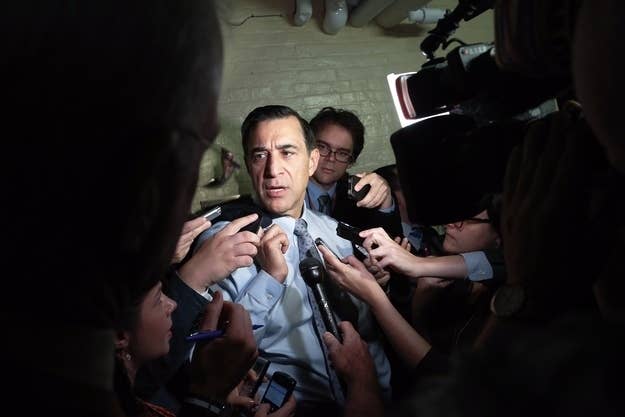
The GOP is arguing that the federal contractor got a sweetheart deal from its ties to the Obama administration, but the company donated just as much to Republicans last cycle. Bipartisan favor-currying.


Republicans' new Obamacare attack line hinges on allegations that the contractor in charge of building the disastrous healthcare.gov website landed the gig through sweetheart deals from the Obama administration.
But according to Federal Election Commission records, that company's PAC gave more to House Republicans than House Democrats during the 2012 cycle — including a $2,000 check for the GOP's chief scandal investigator, Oversight Committee Chair Darrell Issa. What's more, executives of CGI Federal personally gave more than twice as much to GOP presidential candidate Mitt Romney than to President Obama. The contractor has also feasted on more than $2.4 billion worth of IT work dating back to the early Bush Administration.
So far, none of that has stopped the Republican National Congressional Committee from suggesting CGI netted hundreds of millions of dollars to create the dysfunctional website because of its ties to the White House
On Wednesday, the NRCC blasted the Republican National Committee's email list heralding a petition it had started that would urge Congress to investigate CGI-Obama ties. The email noted the importance of finding out, among other pressing questions, "How did [CGI] get contracted to do it?"
Twenty-eight hours later, the NRCC had its answer. "NRCC Investigation of HealthCare.gov Finds Insider Deals Worth Over $400 Million," the next missive declared. The email itself doesn't reference any evidence of "insider deals," but the conservative Daily Caller has been building the case for weeks by noting the company had given donations to Obama and other Democrats and that its executives had visited the White House regularly.
Yet FEC records indicate executives for CGI gave $5,550 to GOP Romney and just $2,000 to Obama — not quite the behavior of a company indebted to the president for its contacting jackpots.
Also, the company's PAC, CGI-AMS, gave $48,000 to 28 GOP members of the House including $5,000 to Rep. Tom Cole (R-Okla.), $6,000 to Rep. Frank Wolf (R-Va.), and $2,000 each to Issa, Appropriations Committee Chair Hal Rogers (R-Ky.), Rep. Kevin Yoder (R-Kan.), now-Sen. Tim Scott (R-S.C.), Rep. Martha Roby (R-Ala.). Yoder, Wolf, and Cole also sit on the Appropriations Committee. Issa, Wolf and Cole also received contributions from the PAC during the 2010 cycle.
Attempts to reach Issa, Yoder, and Wolf were unsuccessful Thursday.
The PAC gave $32,000 to 13 Democratic House members. They also gave $29,500 to Democrats running for Senate and $19,000 to Republican Senate candidates, reflecting a savvy record of giving more to members of the parties in power in each chamber.
The bipartisan giving makes sense given that CGI's first federal contract for IT work started in 2001 and, as a multibillion-dollar firm, has many lobbying interests in congress.
In fact, USASpending.gov, the federal site tracking government contracts, shows CGI has been the contractor of choice for a wide range of computer systems work throughout the Bush Administration, including hundreds of multimillion-dollar contracts for the Departments of Defense, Agriculture and Health and Human Services.
The contract under which CGI did the Obamacare website work, in fact, began in 2007 as a contract with HHS to handle Medicare and Medicaid IT.
When the Affordable Care Act passed in 2010 with all of its tentacles intersecting with those programs, there was almost no way CGI wasn't going to get to expand the scope of their existing contract, contracting experts say. Federal contracting rules are strict — so as to avoid political meddling — and they favor entrenched, large companies with track records. And if the case of CGI's shoddy work doesn't appear to represent partisan favoritism, it does appear to underscore broader problems with the system.
"This was not a patronage deal," said George Washington Law School professor Joshua I. Schwartz, co-director of the university's Government Procurement Law Program. "The one thing members and the president do not seem to have is influence over who gets a particular contract. They just don't."
Clay Johnson, a former Presidential Innovation Fellow under Obama who has excoriated the White House and HHS for its handling of the site, nonetheless also believes the problem stems from the procurement process and the biases that keep small, nimble tech start-ups from getting this kind of work.
"The buck definitely has to stop somewhere, but I think it's the public's fault for turning a blind eye on this contract situation for so long," he said. "You don't see members of Congress winning elections by campaigning for comprehensive procurement reform."